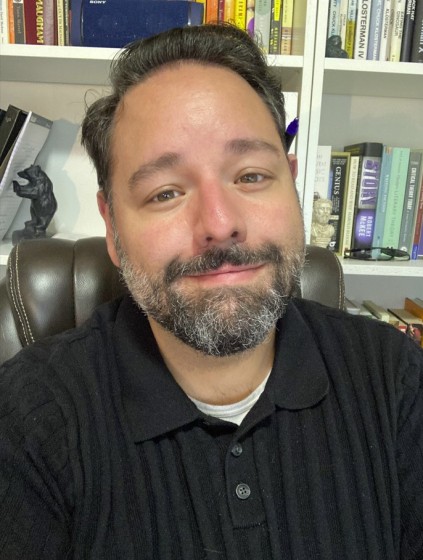
Andrew Barbero lives and works in Calgary, Alberta, where he practices law and writes fiction on the side. A graduate of the University of Calgary’s creative writing and English literature program, his short stories and journalism have appeared across Western Canada. He is currently completing his first crime novel and co-authoring a young adult project with novelist Marc Herman Lynch. When he’s not working, Andrew is happiest browsing bookshops or reading by the lake at his family cabin.
10 Questions for Andrew
Who is your favourite Canadian author (live or dead, doesn’t have to be mystery)?
There are so many excellent Canadian writers, but I’d spotlight my first favourite — Eric Wilson. He wrote those tremendous Tom and Liz Austen young adult books with titles like Murder on the Canadian, Vampires of Ottawa, and Code Red at the Supermall that made me fall in love with mysteries when I was a kid. The books were unapologetically Canadian, and for kids inundated with American culture, it hadn't occurred to us that our own country could be seen as an ideal setting for thrillers. Tom and Liz solved mysteries across most provinces and even a territory or two, bringing well-written, well-plotted crime stories to locales that young readers would know firsthand. He had a tremendous impact on many readers and writers of my generation, which the CWC recognized when Wilson was awarded the Derrick Murdoch Award for lifetime achievement in 1990.
What is your favourite movie?
It’s hard to narrow it down to just one, but my first thought was The Grand Budapest Hotel, written and directed by Wes Anderson. I love Anderson’s eye and originality, and I admire the character-driven, fun murder-mystery plot that explores a beautiful world, big themes, and sincere emotion. It’s a gem.
If you could move to any province (or specific city in Canada) where would you live? (You can choose to stay where you are)
I am Calgary-born and raised, but my family has a cabin in the Shuswap region of British Columbia, and there’s little better than being on the water and in the deep woods out that way.
Are you a plotter or a pantser?
I’m a hardcore plotter. My idea of heaven is my home office covered in beat sheets, a flow chart, diagrams of different levels of conflict, visual aids of five-act structures plotted out on a whiteboard, and scenes written on colour-coded index cards tacked up on the wall.
On average, how long do you write in a day?
My best progress comes from hitting a word target goal rather than a time goal each day. Working a full-time job, volunteering and living life, 1,000 words is a good day for me. If that takes 40 minutes, that’s great. If that takes 3 hours, that’s less great. But it is the number of words, not the time, that I use to mark a successful day.
Have you ever travelled somewhere and thought, I’m going to set my next novel here?
My travels once took me to Nazaré, Portugal, which is world-famous among surfers for its incredible 15- to 20-metre waves. However, what struck me was the funicular system that connects the portion of the town by the sea with the portion of town perched on the clifftop, the narrow streets, medieval churches, and a unique headscarf and flannel skirt combo worn by the town’s women (although the outfit is primarily used to pull in the tourists now). It was an unexpected burst of natural, mechanical and cultural intrigue. I broke off from my friends to sit at a cafe and cram as many notes on sounds, sights, smells and plot ideas on my phone as I could before getting dragged away for more sightseeing.
Do you have any unfinished manuscripts in your drawer/computer?
Absolutely. I’m like most writers, I imagine, in that I’ve had ideas that have lived in the back of my mind for many years, waiting their turn to be polished into what I hoped they could be, or to find the time to put the words on paper finally.
Are you proud of the first novel/story that you wrote? And, did you let other people read it?
I am proud of the first novel I wrote, more for the fact that I wrote it than the work itself. There’s something about proving to yourself that you are capable of producing that full-length manuscript, and once you clear that hurdle in your mind, every other idea seems executable. That’s invigorating.
I was fortunate enough to have a full critique of the manuscript in a creative writing workshop. I learned a lot about writing, so even if nothing ever comes of that manuscript, it will always be important to me and my development as a writer.
Are you part of a writing critique group?
I was fortunate to make life-long friends in my creative writing classes in university. That cohort of writers stayed together to form a writing group after graduation. We called ourselves “More Soup Than Man” (for reasons I won’t explain here), and it was a wonderful community for many years. We had more than twenty writers flow in and out of the group over the years, but the group saw its members through three published novels, master's and PhD theses, and dozens of manuscripts, comic books, and even a scripted podcast. Marriages, children, Covid, moves, and life have dwindled the membership in recent years, but that’s the group where I began working with my writing partner, Marc Herman Lynch, with whom I am currently working on a young adult project.
What is your goal as a writer?
Primarily, the goal is to fully express the ideas in my head and put in the effort to write a book that I can be proud of. That's what I can control, so that's where my focus goes.